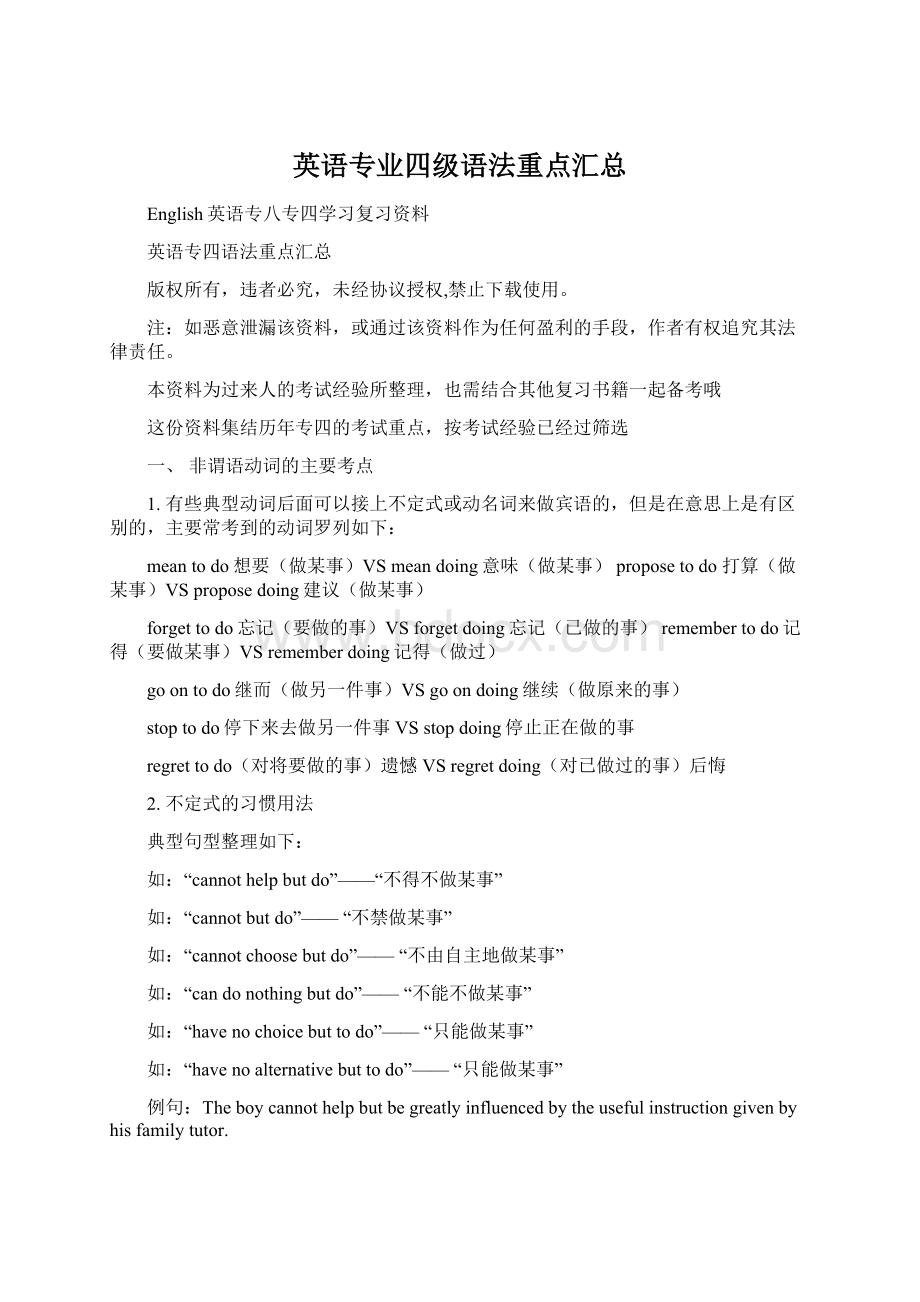 英语专业四级语法重点汇总.docx
英语专业四级语法重点汇总.docx
- 文档编号:4354452
- 上传时间:2022-11-30
- 格式:DOCX
- 页数:23
- 大小:34.64KB
英语专业四级语法重点汇总.docx
《英语专业四级语法重点汇总.docx》由会员分享,可在线阅读,更多相关《英语专业四级语法重点汇总.docx(23页珍藏版)》请在冰豆网上搜索。

英语专业四级语法重点汇总
English英语专八专四学习复习资料
英语专四语法重点汇总
版权所有,违者必究,未经协议授权,禁止下载使用。
注:
如恶意泄漏该资料,或通过该资料作为任何盈利的手段,作者有权追究其法律责任。
本资料为过来人的考试经验所整理,也需结合其他复习书籍一起备考哦
这份资料集结历年专四的考试重点,按考试经验已经过筛选
一、非谓语动词的主要考点
1.有些典型动词后面可以接上不定式或动名词来做宾语的,但是在意思上是有区别的,主要常考到的动词罗列如下:
meantodo想要(做某事)VSmeandoing意味(做某事)proposetodo打算(做某事)VSproposedoing建议(做某事)
forgettodo忘记(要做的事)VSforgetdoing忘记(已做的事)remembertodo记得(要做某事)VSrememberdoing记得(做过)
goontodo继而(做另一件事)VSgoondoing继续(做原来的事)
stoptodo停下来去做另一件事VSstopdoing停止正在做的事
regrettodo(对将要做的事)遗憾VSregretdoing(对已做过的事)后悔
2.不定式的习惯用法
典型句型整理如下:
如:
“cannothelpbutdo”——“不得不做某事”
如:
“cannotbutdo”——“不禁做某事”
如:
“cannotchoosebutdo”——“不由自主地做某事”
如:
“candonothingbutdo”——“不能不做某事”
如:
“havenochoicebuttodo”——“只能做某事”
如:
“havenoalternativebuttodo”——“只能做某事”
例句:
Theboycannothelpbutbegreatlyinfluencedbytheusefulinstructiongivenbyhisfamilytutor.
WhenIstartmyjobcareer,IcannotchoosebutlookbackuponthebeautifuldaysIspentoncampus.
3.动名词的习惯用法
典型动名词的习惯句型整理罗列如下:
如:
bebusy/activedoingsth.
如:
It’snogood/usedoingsth.
如:
spend/wastetimedoingsth.
如:
havedifficulty/trouble/problemdoingsth.
如:
haveagood/great/wonderfultimedoingsth.
如:
Thereisnopoint/sense/harm/usedoingsth.
例句:
Thereisnousecryingoverspiltmilk.(典型例句)
牛奶洒了,哭也没用;后悔是没有用的;覆水难受
IreallyhaveproblemsolvingthesemathematicquestionssinceIamnotmajorinscienceafterall.
二、形容词与副词及其比较级
1.形容词的句法功能
形容词通常在句子中用做定语、表语与主语的语法成分,通常考到的知识点总结如下:
(1)以“a”开头的形容词
如“alone”、“alike”、“asleep”、“awake”等一般不能做前置定语,通常是做表语或后置定语的
例句:
Jerrydidn’tpasstheimportantfinalexam,pleaselethimaloneforthetimebeing.
Michaelcamebackfromjobjustnow,andhiseyeswereshutandheseemedtohavefallenasleep.
(2)某些以副词词缀“-ly”结尾的词其实是形容词,不能看错是副词,例如“friendly”、“leisurely”、“lovely”等
(3)下列动词既是实义动词又是系动词,注意用做系动词时,要求形容词做表语
这些典型单词罗列如下:
“remain”、“keep”、“become”、“get”、“grow”、“go”、“come”、“turn”、“stay”、“stand”、“run”、“prove”、“seem”、“appear”、“look”等
例句:
Thesituationremainstensebetweenthetwocountriesatthisjuncture.在这个节骨眼上,两国形势仍然持续紧张。
Thereisstrongpossibilitythatsuchastyleofmutualcooperationwillproveunworkable.这种合作模式大有可能行不通。
2.某些词虽然不用比较级形式却自身带有比较概念
这些典型词汇总结如下:
“inferior”、“minor”、“senior”、“prior”、“preferto”、“superior”、“major”、“junior”、“preferable”、“differfrom”、“comparedwith”、“incomparisonwith”、“differentfrom”、“ratherthan”等
例句:
Aftervisitingatweekends,Ithinktheirvillaissuperiortoalltheothervillasinthecountryside.
3.有关比较级的特殊句型
(1)notsomuch…as…与其说…还不如说…
例句:
Themajorreasonforhissuicideisn’tsomuchhisnegativeemotionsashisincapacitytotakecareofhimself.
(2)no/notanymore…than…两者一样都不…
例句:
Itiswellacknowledgedbythepublicthattheheartisnoanymoreintelligentthanthestomach,fortheyarebothcontrolledbythebrainaltogether.
(3)no/notanyless…than…两者一样都…
例句:
IwasgoodatalmostallsubjectswhenIwasinthejuniorhighschool,andparticularlyspeaking,mathematicswasnoanylessgoodthanphysicsatthattime.
(4)justas…so…正如…,…也…(会使用到倒装结构)
例如:
Justaschocolateisapartofmyfavoritefood,soistheicecream.
三、虚拟语气
简明概述:
虚拟语气是指说话人讲话的内容与现实或事实相反,是一种主观假想的情况。
时态:
可表示过去、现在和将来,特征是时态相应退后。
1.与现在事实相反的主观假设:
条件从句
主句
一般现在时改为一般过去时注:
be动词一律改为were
should/would/could/might+动词原形
例句:
IftherewereanEnglishdictionary,wecouldconsultitforthisdifficultword.
Ifmybiggerbrotherwerehere,hewoulddousafavortomovetheheavybox.
2.与过去事实相反的主观假设:
条件从句
主句
一般过去时改为过去完成时
should/would/could/might+have+过去分词
例句:
Ifhehadstudiedmorediligently,hewouldhavepassedtheexamundoubtedly.
Ifmyfavoriteteacherhadbeenhereyesterday,Iwouldhavepaidmoreattentiontothelesson.
Ifthechildhadbeenmorecareful,hewouldnothavemadesuchafoolishmistake.
3.与将来事实相反的主观假设:
条件从句
主句
一般过去时
注:
be动词一律改为were
should/would/could/might+动词原形
were+todosth
should+动词原形
例句:
Ifyoumadegreatprogressinthenearfuture,youshouldnotforgetyourteachers.
Ifyouweretomakegreatprogressinthenearfuture,youshouldnotforgetyourteachers.
Ifyoushouldmakegreatprogressinthenearfuture,youshouldbegratefultoyourteachers.
混合条件句:
主句和条件从句所发生的时间点不一致,这个时候就需要根据各自的时态进行倒退来做相应修改。
例句:
Ifyouhadfinishedyourhomeworkbyyourselfyesterday(过去),youwouldnotcopyother’sanswersinahurry(现在).
Ifyouhadaskedyourmotherhowtocooklastweek(过去),youwouldknowclearlyeachcookingstepofthedish(现在).
虚拟语气的倒装
如果从句中有were,should,had,则需要倒装。
倒装方法:
将if省略,再把were,should,had挪到从句的句首。
注:
如果从句中没有were,should,had,则不能省略if,也不可倒装。
例句:
原句:
Ifmybiggerbrotherwerehere,hewouldhelpustomovetheheavybox.
倒装:
Weremybiggerbrotherhere,hewouldhelpustomovetheheavybox.
原句:
Ifthechildhadbeenmorecareful,hewouldnothavemadesuchafoolishmistake.
倒装:
Hadthechildbeenmorecareful,hewouldnothavemadesuchafoolishmistake.
原句:
Ifyoushouldmakegreatprogressinthenearfuture,youshouldbegratefultoyourteachers.
倒装:
Shouldyoumakegreatprogressinthenearfuture,youshouldbegratefultoyourteachers.
虚拟语气词:
should
很简单,三种形式
(1)Itissuggested/requested/ordered,etc.(具有命令,建议,要求等口吻的动词过去分词)+thatsbshould(should可省略)do(动词原形)sth.
注:
这类动词还可以有其他三种从句形式来代替。
例如:
原句:
Itissuggestedthatstudents(should)usedictionaryinexam.
宾语从句:
Isuggestthatstudents(should)usedictionaryinexam.
表语从句:
Mysuggestionisthatstudents(should)usedictionaryinexam.
同位语从句:
Iprovidedasuggestionthatstudents(should)usedictionaryinexam.
(2)Itisnecessary/important/indispensable,etc.(带有主观色彩的形容词)+thatsb(should)dosth.
(3)Itisapity/ashame,etc.(名词性词组)+thatsb(should)dosth.
虚拟语气特殊句型:
Itishigh(high可省略)timethat…该是……的时候了
“that…”从句动词可以用
(1)过去时
(2)should(不能省略)+动词原形
例句:
Itis(high)timethatweshoulddrawupacontract.
Itis(high)timethatwedrewupacontract.(草拟合同)
含蓄虚拟语气
除了常规的连词if以外,还可以借助其他介词、介词词组、句子来引导虚拟语气从句。
1.Without“要是没有……”
例句:
Withouttherescueoffirefighterstimely,ourliveswouldnothavebeensaved.
2.Butfor“要不是……”
例句:
Butforyourprofessionalhelp,Icouldnothaveachievedsuchabigprogressinmedicalcommunity.
3.Under…“在某种情况下……”
例句:
Undersuchcircumstances,thecriminalwouldnothaveperpetratedactsofviolenceuponchildren.
4.With…“有……的前提下”
例句:
Withthedatacollectedonemonthearlier,wecouldfinishtheprojectmoreefficiently.
5.Intheabsenceof…“如果没有……”
例句:
Intheabsenceoflaw,womenwouldcontinuetolacktheirrightstovoteontheirown.
6.Otherwise“否则”
例句:
Wedidn’tknowhiseducationalbackgroundandachievementinthisfield,otherwisewewouldhavefiredhim.
7.Ifitwerenotfor…“要不是……(用于现在的情况)”
例句:
Ifitwerenotforthebrilliantguidanceof,wecouldnotleadahappylife.
8.Ifithadnotbeenfor…“要不是……(用于过去/已经发生的情况)”
例句:
Ifithadnotbeenformyillness,IwouldhaveattendedthisimportantmeetinglastMonday.
倒装:
Haditnotbeenformyillness,IwouldhaveattendedthisimportantmeetinglastMonday.
9.asif/asthough…“好像…似的”
按照具体的语境,既可以用虚拟语气(表示与实际情况相反、主观臆断)、也可以用陈述语气(表示实现的可能性较大或所说情况即是事实)
例句:
Timecantakeawayourhappinessandsadnessasif/thoughitwasendowedwithmagicpower.(与现在事实相反的虚拟语气)
Myteacherhascontributedherselfalotasif/thoughshewasacandle,whichlightsothersandconsumesitself.(与现在事实相反的虚拟语气)
Thestudentstudiedindustriouslyasif/thoughhehadneverfelttiredandexhausted.(与过去事实相反的虚拟语气)
Theboystillstayscalmasif/thoughhehasknownalready.(就是事实,按实际的时态即可)
四、定语从句
简明概述:
定语从句在句中充当定语的角色,修饰句中前面所提到的名/代词。
被修饰的名/代词称为先行词。
关系代词(who,whom,whose,which,that):
注:
没有what
关系代词所代替的主要是人或物的名/代词,在句中充当主语、宾语、定语等成分。
who,whom,that都可代替人
例句:
Istheboywho/thatcheatedintheexamination?
(who/that作为从句主语,代替theboy)
Heisthemanwhom/thatwewon’trecruitduetohiscriminalrecords.(who/that作为从句宾语,代替theman)
whose可指代人或物
注:
如果whose指物的话,也可以用ofwhich来代替。
例句:
Ourconversationwasstoppedbyamanwhosehairisblonde.
Ilenthimthisbookwhosepagescurledupduetomyconstantuse.
=Ilenthimthisbookthepagesofwhichcurledupduetomyconstantuse.
which,that代替事物
例句:
We’llneverforgettheatrociousviolencewhich/thatwascommittedbyJapanesesoldiers.
Isthatfashionshow(which/that)youweretalkingaboutjustnow?
(作宾语时可省)
关系副词(when,where,why):
关系副词分别代替的先行词为时间、地点和原因,在从句中充当状语的角色。
注:
when,where,why也可用“介词+which”来代替。
例句:
Thiswasthemomentwhen/atwhichthetwosidesreachedadeadlockagainandterminatedtheirnegotiation.
Xi’anisoneofthemostfamousculturalcitieswhere/inwhichmillionsofworldwidetouristswillchoosetomakeatour.
Isthisthereasonwhy/forwhichthereisasevereshortageoffundsforourresearch?
注:
that是可以代替关系副词的,即that可取代“when,where,why”和“介词+which”的形式。
(在口语中that可省略)
注:
介词后面的关系词不能省略,而且that前不能有介词
例句转换:
Thiswasthemomentthatthetwosidesreachedadeadlockagainandterminatedtheirnegotiation.
Xi’anisoneofthemostfamousculturalcitiesthatmillionsofworldwidetouristswillchoosetomakeatour.
Isthisthereasonthatthereisasevereshortageoffundsforourresearch?
限制性/非限制性定语从句
重点概括整理:
限制性定语从句先行词是不能省略的,因为省了先行词的话,句子的意思就会变得不完整和不明确,缺少必要的说明解释。
而非限制性定语从句是先行词的额外说明,是可以省略的,省了也不会影响句子的意思和整体性,并且与主句之间常用“,”隔开。
比较例句:
Thisisthebook(which/that)Iboughtyesterday.(限制性)
Thisbook,Iboughtyesterday,isveryinspiring.(非限制性)
通常是非限制性定语从句的情况分析:
StevenSpielberg,(whom)IadmireverymuchinHollywoodmovie-makingfield,wonanotherOscarAwardthisyear.(专有名词/人名)
Mybeloveddog,(which)Ibought5yearsago,hascaughtabadcoldrecently.(有物主代词的时候)
Thisexperiment,whichwasconductedlastweekends,provestobeabigsuccess.(有指示代词的时候)
Herchildwasalwaysabsent-mindedinlearningandfailedinexams,wh
- 配套讲稿:
如PPT文件的首页显示word图标,表示该PPT已包含配套word讲稿。双击word图标可打开word文档。
- 特殊限制:
部分文档作品中含有的国旗、国徽等图片,仅作为作品整体效果示例展示,禁止商用。设计者仅对作品中独创性部分享有著作权。
- 关 键 词:
- 英语专业 语法 重点 汇总
 冰豆网所有资源均是用户自行上传分享,仅供网友学习交流,未经上传用户书面授权,请勿作他用。
冰豆网所有资源均是用户自行上传分享,仅供网友学习交流,未经上传用户书面授权,请勿作他用。


 广东省普通高中学业水平考试数学科考试大纲Word文档下载推荐.docx
广东省普通高中学业水平考试数学科考试大纲Word文档下载推荐.docx
 成都仁和新城购物中心考察PPT.pptx
成都仁和新城购物中心考察PPT.pptx
